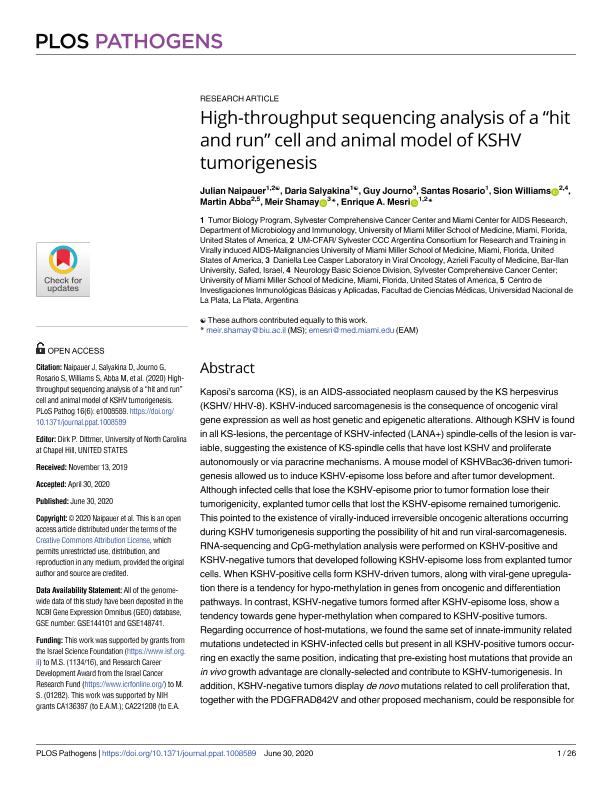Artículo
High-throughput sequencing analysis of a “hit and run” cell and animal model of KSHV tumorigenesis
Naipauer, Julian ; Salyakina, Daria; Journo, Guy; Rosario, Santas; Williams, Sion; Abba, Martín Carlos
; Salyakina, Daria; Journo, Guy; Rosario, Santas; Williams, Sion; Abba, Martín Carlos ; Shamay, Meir; Mesri, Enrique Alfredo
; Shamay, Meir; Mesri, Enrique Alfredo
 ; Salyakina, Daria; Journo, Guy; Rosario, Santas; Williams, Sion; Abba, Martín Carlos
; Salyakina, Daria; Journo, Guy; Rosario, Santas; Williams, Sion; Abba, Martín Carlos ; Shamay, Meir; Mesri, Enrique Alfredo
; Shamay, Meir; Mesri, Enrique Alfredo
Fecha de publicación:
06/2020
Editorial:
Public Library of Science
Revista:
Plos Pathogens
ISSN:
1553-7366
e-ISSN:
1553-7374
Idioma:
Inglés
Tipo de recurso:
Artículo publicado
Clasificación temática:
Resumen
Kaposi's sarcoma (KS), is an AIDS-associated neoplasm caused by the KS herpesvirus (KSHV/ HHV-8). KSHV-induced sarcomagenesis is the consequence of oncogenic viral gene expression as well as host genetic and epigenetic alterations. Although KSHV is found in all KS-lesions, the percentage of KSHV-infected (LANA+) spindle-cells of the lesion is variable, suggesting the existence of KS-spindle cells that have lost KSHV and proliferate autonomously or via paracrine mechanisms. A mouse model of KSHVBac36-driven tumorigenesis allowed us to induce KSHV-episome loss before and after tumor development. Although infected cells that lose the KSHV-episome prior to tumor formation lose their tumorigenicity, explanted tumor cells that lost the KSHV-episome remained tumorigenic. This pointed to the existence of virally-induced irreversible oncogenic alterations occurring during KSHV tumorigenesis supporting the possibility of hit and run viral-sarcomagenesis. RNA-sequencing and CpG-methylation analysis were performed on KSHV-positive and KSHV-negative tumors that developed following KSHV-episome loss from explanted tumor cells. When KSHV-positive cells form KSHV-driven tumors, along with viral-gene upregulation there is a tendency for hypo-methylation in genes from oncogenic and differentiation pathways. In contrast, KSHV-negative tumors formed after KSHV-episome loss, show a tendency towards gene hyper-methylation when compared to KSHV-positive tumors. Regarding occurrence of host-mutations, we found the same set of innate-immunity related mutations undetected in KSHV-infected cells but present in all KSHV-positive tumors occurring en exactly the same position, indicating that pre-existing host mutations that provide an in vivo growth advantage are clonally-selected and contribute to KSHV-tumorigenesis. In addition, KSHV-negative tumors display de novo mutations related to cell proliferation that, together with the PDGFRAD842V and other proposed mechanism, could be responsible for driving tumorigenesis in the absence of KSHV-episomes. KSHV-induced irreversible genetic and epigenetic oncogenic alterations support the possibility of “hit and run” KSHV-sarcomagenesis and point to the existence of selectable KSHV-induced host mutations that may impact AIDS-KS treatment.
Palabras clave:
KSHV
,
KAPOSI
,
SARCOMA
,
ONCOGENOMICS
Archivos asociados
Licencia
Identificadores
Colecciones
Articulos(CCT - LA PLATA)
Articulos de CTRO.CIENTIFICO TECNOL.CONICET - LA PLATA
Articulos de CTRO.CIENTIFICO TECNOL.CONICET - LA PLATA
Citación
Naipauer, Julian; Salyakina, Daria; Journo, Guy; Rosario, Santas; Williams, Sion; et al.; High-throughput sequencing analysis of a “hit and run” cell and animal model of KSHV tumorigenesis; Public Library of Science; Plos Pathogens; 16; 6; 6-2020; 1-26
Compartir
Altmétricas



